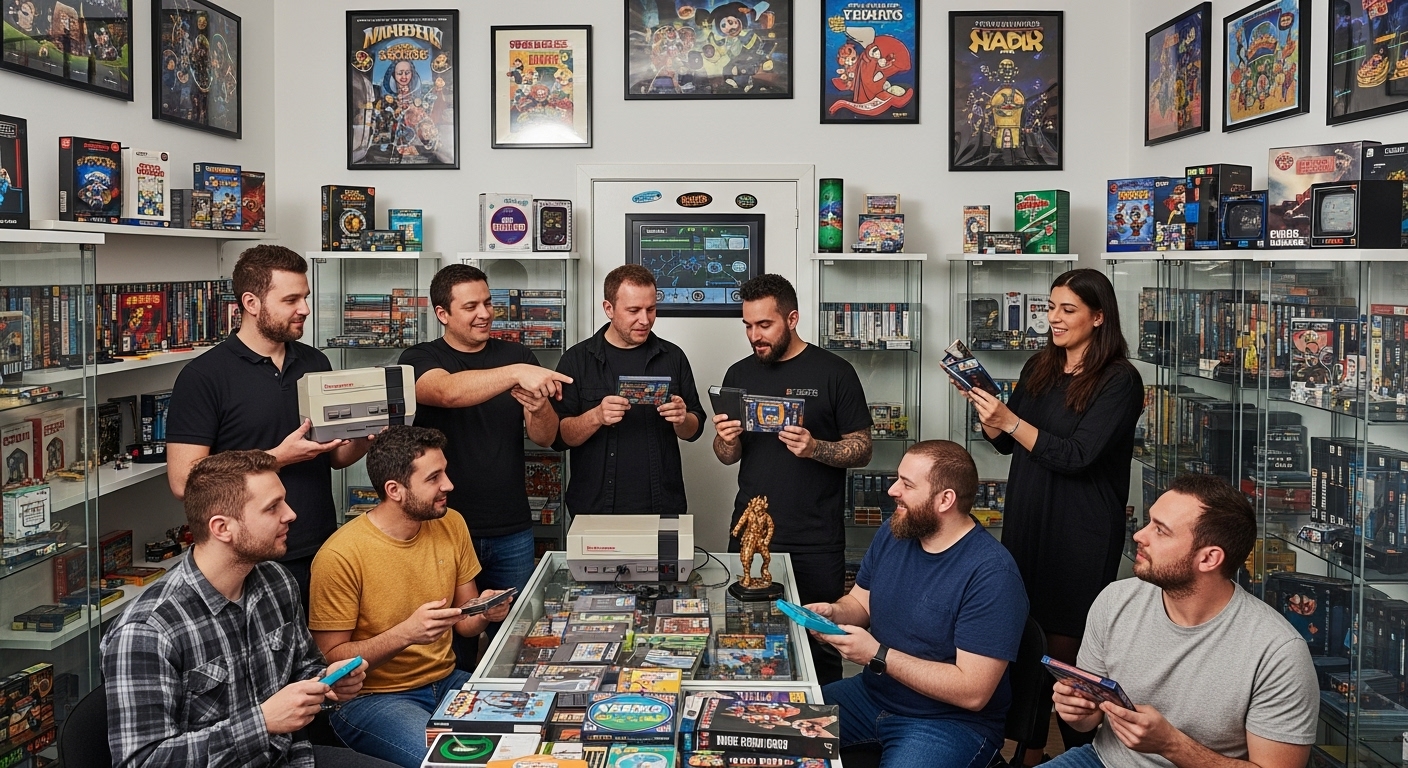Video games have become one of the most significant cultural and artistic forms of the modern era. What started as simple pixelated diversions has grown into an industry that generates billions of dollars, rivals blockbuster films, and influences art, technology, and entertainment across the world. As gaming has evolved, so too has the need to preserve its history. Unlike literature, which can be reprinted, or music, which can be recorded, games exist in a fragile state, bound to the technology of their time. Without conscious preservation, entire eras of gaming could disappear forever.
This is where game collectors play a vital role. Game collectors are more than just fans who buy and keep old cartridges or discs. They act as guardians of gaming heritage, ensuring that titles, consoles, and memorabilia survive beyond their intended lifespans. By doing so, they preserve not only the entertainment of the past but also the cultural and historical significance of an art form that continues to shape the world.
The Importance of Preserving Gaming History
Preservation matters because video games are more than toys. They are cultural documents that reflect the time and place in which they were created. Games from the 1980s reflect the early days of computing, when limited technology forced developers to rely on creativity and simplicity. Games from the 1990s showcase the rise of 3D graphics, the growing influence of Japanese studios, and the global spread of gaming as a mainstream activity. Modern titles highlight the fusion of storytelling, cinematic presentation, and advanced technology.
Without preservation, future generations would lose the ability to experience these milestones firsthand. Imagine trying to understand the history of film without ever watching a silent movie or attempting to study literature without reading Shakespeare. Video games deserve the same care and recognition, and game collectors are at the heart of this effort.
Who Are Game Collectors
Game collectors are individuals who dedicate time, effort, and resources to obtaining and preserving physical and digital games, hardware, and related materials. While some may focus on nostalgia by collecting games they grew up with, others adopt a more archival mindset, striving to assemble complete sets of consoles, rare prototypes, or even promotional materials.
These collectors often view themselves as caretakers of history. They see value not just in the game itself but in its packaging, manuals, artwork, and even advertisements. To them, every detail contributes to understanding the context in which the game was released. By preserving these artifacts, collectors maintain a living record of gaming’s evolution.
The Fragility of Video Game Media
One reason collectors are so essential is the fragile nature of video game media. Cartridges, discs, and magnetic storage devices degrade over time. Old floppy disks can become unreadable, and early CDs are vulnerable to scratching and decay. Even cartridges, which are generally more durable, are not immune to failure as internal batteries used for saving progress eventually die.
Hardware faces similar risks. Consoles and handheld systems can stop working as components wear out. Without collectors maintaining and repairing these devices, many games would become unplayable. The unique hardware of older systems means that emulation alone cannot fully capture the authentic experience. Collectors preserve not only the software but also the machines that brought these games to life.
Collectors as Archivists
Many game collectors operate as informal archivists. They meticulously catalog their collections, noting details such as release dates, variations in packaging, regional differences, and developer information. This documentation helps researchers, historians, and even developers understand the industry’s past.
For example, some collectors track down prototypes and unreleased games. These rare items often reveal insights into the development process, showcasing ideas that were changed, abandoned, or never released to the public. Without collectors rescuing these prototypes, such knowledge would be lost forever.
Collectors also collaborate with preservation groups and museums, lending or donating parts of their collections for exhibitions. In doing so, they help share gaming history with wider audiences, from casual fans to academic researchers.
The Role of Nostalgia in Preservation
Nostalgia is a powerful motivator for many collectors. Games are deeply tied to personal memories, and owning a piece of that past can be emotionally rewarding. A cartridge of a childhood favorite or a console that defined teenage years becomes more than just an object—it becomes a time machine that allows people to relive moments of joy.
However, nostalgia also plays a broader role in preservation. By valuing old games for personal reasons, collectors inadvertently save them for historical reasons as well. What begins as a sentimental hobby often grows into a passion for preserving entire libraries of games, ensuring that history does not fade with time.
Rare and Valuable Games
The market for rare and valuable games illustrates the importance of collectors in preservation. Some titles were released in small quantities, while others were quickly discontinued or region-specific. Without collectors, these games might disappear entirely. Examples include early limited releases, promotional cartridges, or games tied to obscure hardware.
While the financial value of these items often makes headlines, their historical value is equally significant. Collectors who invest in rare games are not only safeguarding them from obscurity but also highlighting their place in gaming history. Even when prices soar, the attention ensures that these games are recognized as valuable cultural artifacts.
Preserving Gaming Culture Beyond Software
Game collectors often preserve more than just games and consoles. They save magazines, strategy guides, advertisements, and merchandise. These materials provide crucial context about how games were marketed, consumed, and discussed. For example, old gaming magazines reveal not only reviews and previews but also the language, trends, and debates of their time.
Merchandise, such as figurines, posters, and promotional items, further reflects the cultural impact of gaming. Preserving these artifacts ensures that future generations can understand gaming as a broader cultural movement, not just a collection of software and hardware.
Challenges Faced by Game Collectors
While collectors play a critical role, they also face significant challenges. One major issue is space. Large collections require storage conditions that protect against heat, humidity, and physical damage. Maintaining such collections can be expensive and demanding.
Another challenge is accessibility. Some collectors keep their treasures private, which limits their impact on broader preservation efforts. Balancing personal ownership with public sharing is an ongoing issue within the collecting community.
Legal challenges also arise, particularly around emulation and digital preservation. While collectors often embrace emulators to ensure games remain playable, copyright restrictions can create tension between preservation and legality. These challenges highlight the need for collaboration between collectors, developers, and institutions.
The Role of Digital Preservation
In addition to physical collecting, digital preservation has become an essential part of saving gaming history. Emulation allows games to be played on modern hardware, ensuring their survival even if original systems fail. Many collectors contribute by sharing ROMs, digital backups, and fan translations of games never released in certain regions.
While digital preservation raises complex legal questions, its importance cannot be overstated. Without it, countless games would be inaccessible to modern audiences. Collectors who digitize their libraries play a crucial role in ensuring that these games remain playable and accessible to future generations.
Collaborations with Museums and Institutions
Increasingly, museums and cultural institutions recognize the value of video games as part of human history. Game collectors often work with these organizations, lending their expertise and artifacts for exhibitions. These collaborations bring gaming history into public view, allowing audiences to appreciate the artistry and cultural impact of games.
For example, exhibitions dedicated to the history of consoles, the evolution of graphics, or the role of storytelling in games often rely heavily on collectors’ contributions. Without private collectors, many institutions would lack the resources to present such comprehensive histories.
Why Game Collectors Matter
Game collectors matter because they serve as the bridge between the past and the future of gaming. Developers are often focused on creating new experiences, while companies may overlook the importance of preserving their older titles. Collectors fill this gap, ensuring that nothing is forgotten.
Their passion ensures that games remain playable, studied, and celebrated. Whether motivated by nostalgia, academic interest, or sheer love of the medium, collectors act as stewards of an art form that continues to define generations.
The Future of Game Collecting
The future of game collecting will likely involve a mix of physical and digital preservation. As more games shift to digital-only releases, collectors will adapt by finding ways to archive downloads and protect them against obsolescence. The community will also continue to collaborate with museums, historians, and developers to ensure that gaming’s legacy is preserved.
Virtual reality and emerging technologies may also change how collections are shared. Imagine digital museums where visitors can interact with preserved games in fully immersive environments. Such innovations could redefine preservation while making gaming history accessible to a wider audience.
Conclusion
Game collectors are more than enthusiasts. They are guardians of history, preserving not just the software and hardware of gaming but also the culture, context, and creativity that surround it. Without their dedication, much of gaming’s past would already be lost to time, fading into obscurity as technology marches forward.
By preserving games, consoles, magazines, and memorabilia, collectors ensure that the story of gaming can be told in full. They protect memories, inspire new generations, and contribute to a cultural legacy that deserves recognition alongside other art forms. As gaming continues to evolve, the role of collectors will remain crucial. They remind us that history is not just written in books or stored in archives but also kept alive in the cartridges, discs, and consoles of the past.

